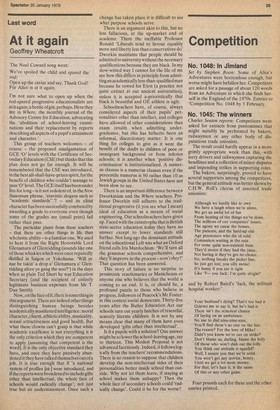Last word
At it again
Geoffrey Wheatcroft
The Noel Coward song went: We've spoiled the child and spared the rod: Open up the caviar and say, Thank God! For Alice is at it again.
I'm not sure what to open up when the rod-spared progressive educationalists are at it again; a bottle ofgin, perhaps. Here they are in Where, the monthly journal of the Advisory Centre for Education, advocating the 'abolition of school-leaving examinations and their replacement by reports describing all aspects of a pupil's attainment and character.'
This group of teachers welcomes — of course — the proposed amalgamation of GCE '0' levels with the Certificate of Secondary Education (CSE) but thinks that this plan does not go far enough. It will be remembered that the CSE was introduced, in the best all-shall-have-prizes spirit, for the benefit of children who couldn't manage to pass '0' level. The GCE itself has been under fire for long —is it not redolent of, in the New Statesman phrase, 'atavistic slogans such as "academic standards" '? — and its elitist character has been successfully combated by awarding a grade to everyone even though some of the grades are (small print) fail rather than pass.
The particular plaint from these teachers — that there are other• things in life than scholastic ability —is a familiar one. We used to hear it from the Right Honorable Lord Glenamara of Glenridding (sounds like one of those whiskies which were once reputedly distilled in Saigon or Yokohama: Will ye nae be takin' a drop a' Glenamara a' Glenridding afore ye gang the noo?') in the days when as plain Ted Short he was Education Secretary (and the recipient of entirely legitimate business expenses from Mr T. Dan Smith).
Now, on the face of it, there is something in this argument. There are indeed other things distinguishing human beings besides academically manifested intelligence: moral character, charm, a thle tic ability, musicality, sexual attractiveness and good health. But what these clowns can't grasp is that while academic excellence is not everything it is the only criterion which they are competent to apply (assuming that competent is the word). It is the only objective standard they have, and once they have passively abandoned it they have talked themselves out of a job. It is true enough that if 'a national • system of profiles [sic I were introduced, and if the reports were broadened to include gifts other than intellectual, the whole face of schools would radically change'; not just true but an understatement. Once such a change has taken place it is difficult to see what purpose schools serve.
There is an argument akin to this, but no less fallacious, at the up-market end of academe. There the ineffable Professor Ronald 'Liberals tend to favour equality more and liberty less than conservatives do' Dworkin maintains that people should be admitted to university without the necessary qualifications because they are black. In my slow-witted way I cannot for the life of me see how this differs in principle from admitting an academically less-than-qualified man because he rowed for Eton (a practice not quite extinct at our ancient universities), unless it is accepted a-prioristically that black is beautiful and OE athlete is ugly.
Schoolteachers have, of course, always considered aspects of their pupils' personalities other than intellect, and colleges have allowed of other considerations than exam results when admitting undergraduates; but this has hitherto been an informal, discretionary matter. It is one thing for colleges to give as it were the benefit of the doubt to children of poor or immigrant background or from inferior schools; it is another when 'positive discrimination' is institutionalized. A numerus clausus is a numerus clausus even if the percentile numerus is 90 rather than 10 as Jewish groups in the United States have not been slow to see.
There is an important difference between Dworkinism and the Where teachers. Professor Dworkin still adheres to the traditional progressive (it you see what I mean) ideal of education as a means of social engineering. Our schoolteachers have given up. Faced with the catastrophe that is British state-sector education today they have no answer except to lower standards still further. Not long ago the dominant attitude on the educational Left was what an Oxford friend calls Iris Murdochism: 'We'll turn all the grammar schools comprehensive, and they'll improve in the process —won't they?' That question has been answered.
This story of failure is no surprise to pessimistic reactionaries or Manicheans or anyone else who believes that the world is coming to an end. It is, or should be, a profound puzzle to those who believe in progress, followers of Peacock's Mr Foster: in this context social democrats. Thirty-five years after the Butler Education Act our schools turn out yearly batches of resentful, scarcely literate children. It is not by any means clear that many of them have even developed 'gifts other than intellectual'.
Is it a puzzle with a solution? One answer might be tolower the school-leaving age, say to thirteen. This Modest Proposal is not advanced facetiously. Indeed, it follows logically from the teachers' recommendations. There is no reason to suppose that children develop the non-intellectual sides of their personalities better inside school than outside. Why not let them leave, if staying at school makes them unhappy? Then the whole face of secondary schools could 'radically change'. Could it be for the worse?


































 Previous page
Previous page